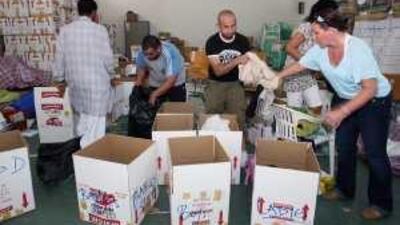Pakistan's economy is shaky. The country is being tested by suicide bombers and insurgency. Now, Pakistanis in the UAE, who have been steadfastly sending money home, are being urged to dig a little deeper to aid their homeland in 2010.
Specifically, they are being urged by their government and community leaders to visit their homeland, invest in the country and use their skills to lead charity initiatives. In 2009, UAE charities, individuals and associations led several campaigns to support Pakistan through another difficult year. "People are concerned about Pakistan and they want to do something to help," said Faisal Tirmizi, a counsellor at the embassy in the capital.
"We have a habit of watching the television and panicking about the situation." Pakistanis living overseas, concerned for loved ones in their homeland, are increasingly glued to media reports. Yasar Khan, the Middle East business head for ARY, a popular Pakistani television network with a bureau in Dubai, said the country's Pakistani population of more than 850,000 were keen to follow events back home. He expects viewing figures to rise in 2010.
"It's very unfortunate in terms of what's happening. Everybody wants to keep knowing about it, and see what happened, how many people died," he said. "There are a lot of people watching news-related programmes." News of bomb blasts or drone attacks, however, were not enough to deter travellers from visiting the country last year. During the first 11 months of 2009 there was a two per cent increase in the number of people travelling to Pakistan from the capital, compared with the same period in 2008, according to the Abu Dhabi Airports Company.
Pakistan is usually the second or third most popular destination from Abu Dhabi, a spokesman ffor the company said. Remittances were also strong in 2009, despite the economic slowdown, and are expected to remain so this year. Remittances to South Asia overall did slow, but Pakistanis bucked the trend and sent more money home. Pakistanis living in the Emirates sent back US$679 million (Dh2.4 billion) from July 1 to October 30, 2009, said Mr Tirmizi. The 2009 total is likely to exceed the previous year's $1.2bn.
"I am so confident in the people here because in spite of the economic meltdown, remittances from the UAE seem to keep hitting records," the counsellor said. "This is the time to invest in the industry and service sectors." Mohammed Khaleeq, the general secretary of the Pakistan Association Dubai (PAD), a community group with more than 2,000 members, said it was unlikely the trend of sending money home would change.
"Most of our members send their money home to support families and they make small investments," he said. "No one is thinking it's a dangerous place." While carrying out several programmes to support Pakistanis living in the UAE, such as free medical camps and English lessons in 2009, PAD also led a campaign to raise funds for the Swat Valley. In 2010, further efforts to support the troubled region will be launched, he said.
In the summer, PAD sent eight 50-tonne containers to the region, packed with medicines and other goods needed by the millions of refugees, who had become homeless amid fighting between the Taliban and the military in the area. It also raised Dh1.5m in charity. Mobisher Rabbani, a political scientist and humanitarian campaigner, helped launch that campaign. In 2010, he said, UAE Pakistanis should use the skills they have to help develop their country.
"What needs to be done is people have to contribute their services for back home as well. If you are a doctor or a person of influence you should try to help people over there," he said. He also urged Pakistanis to push for their right to vote this year. "In the last two elections, they couldn't have voted. They haven't been active in trying to get their vote. Nobody went to the authorities and the last time overseas Pakistanis could vote was in 2000."
In 2010, PAD has promised its members that it will use official visits from Pakistani parliamentarians to voice their concerns, one of which has been the right to vote, and boost their status as overseas nationals. "This year we seem to be closer to the diplomatic quarters. The ministers come to Dubai quite often and this is an opportunity to exchange views and convey what we think. We want to focus on these kind of meetings and voice the concerns of the community."
PAD, the largest expatriate group for Pakistanis in the UAE, will also continue to preach a message of peace in 2010. "The situation in Pakistan is not particularly encouraging. In our programmes, we try and teach people to be peaceful citizens," he said. asafdar@thenational.ae

